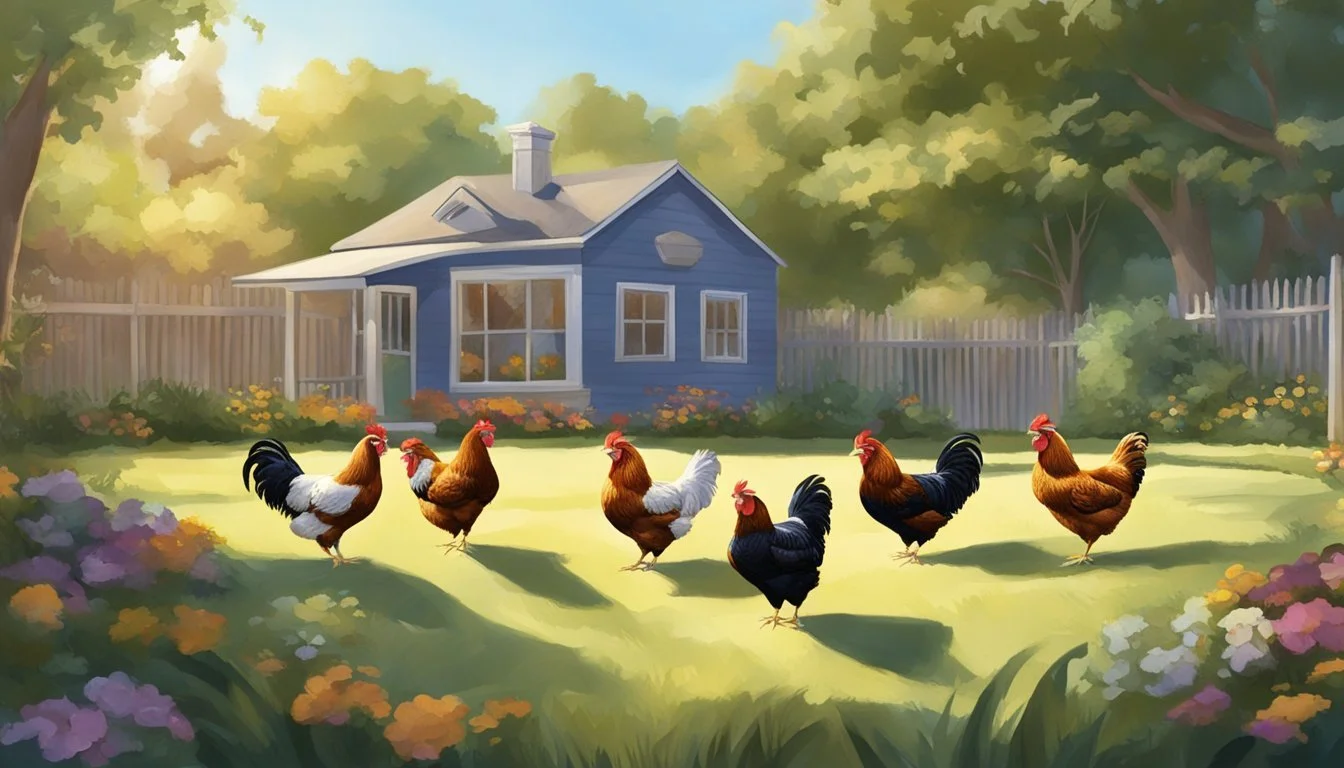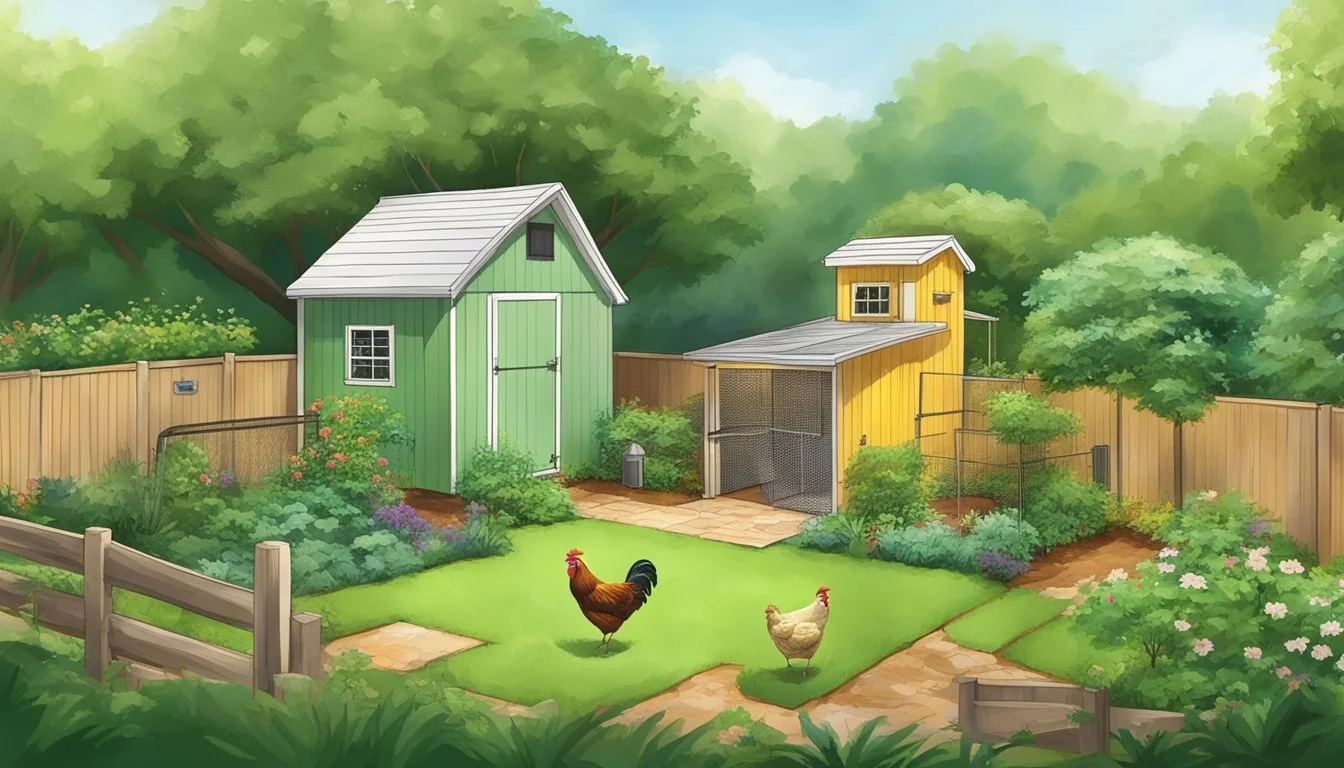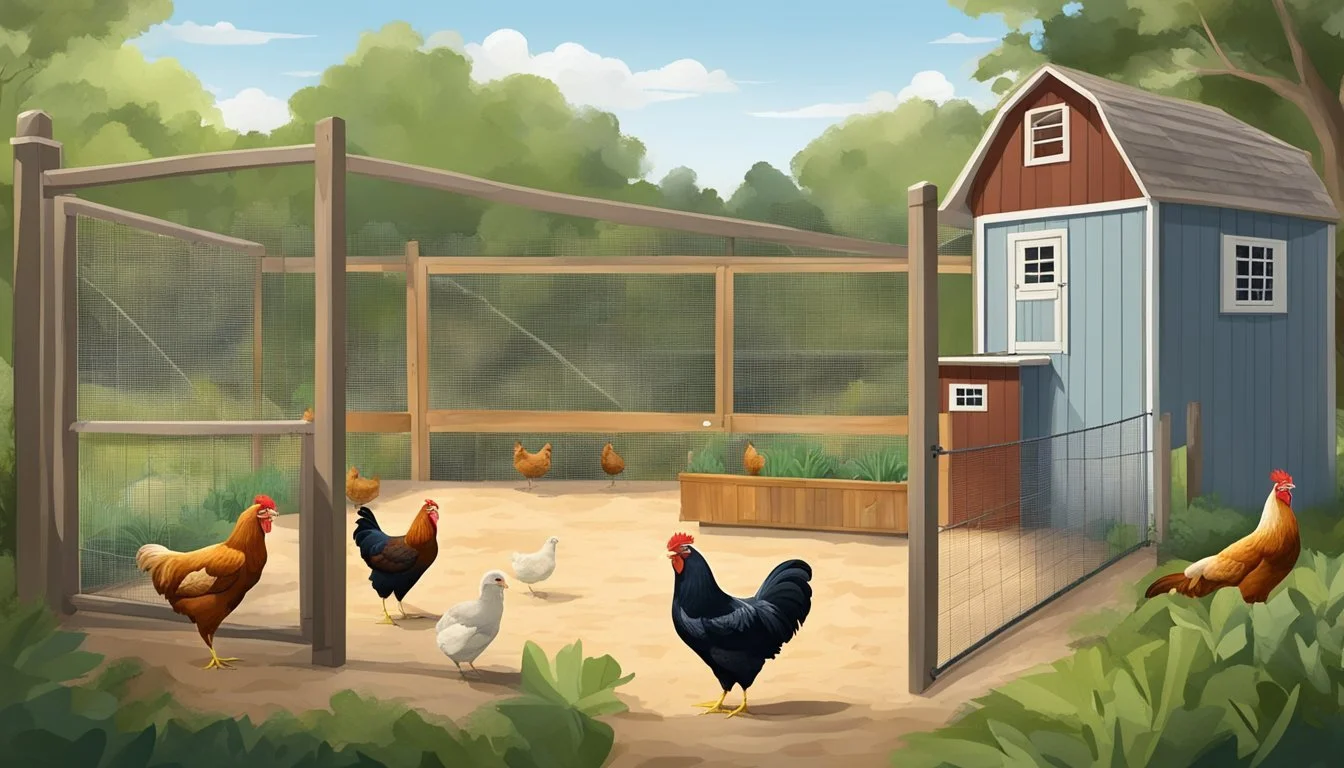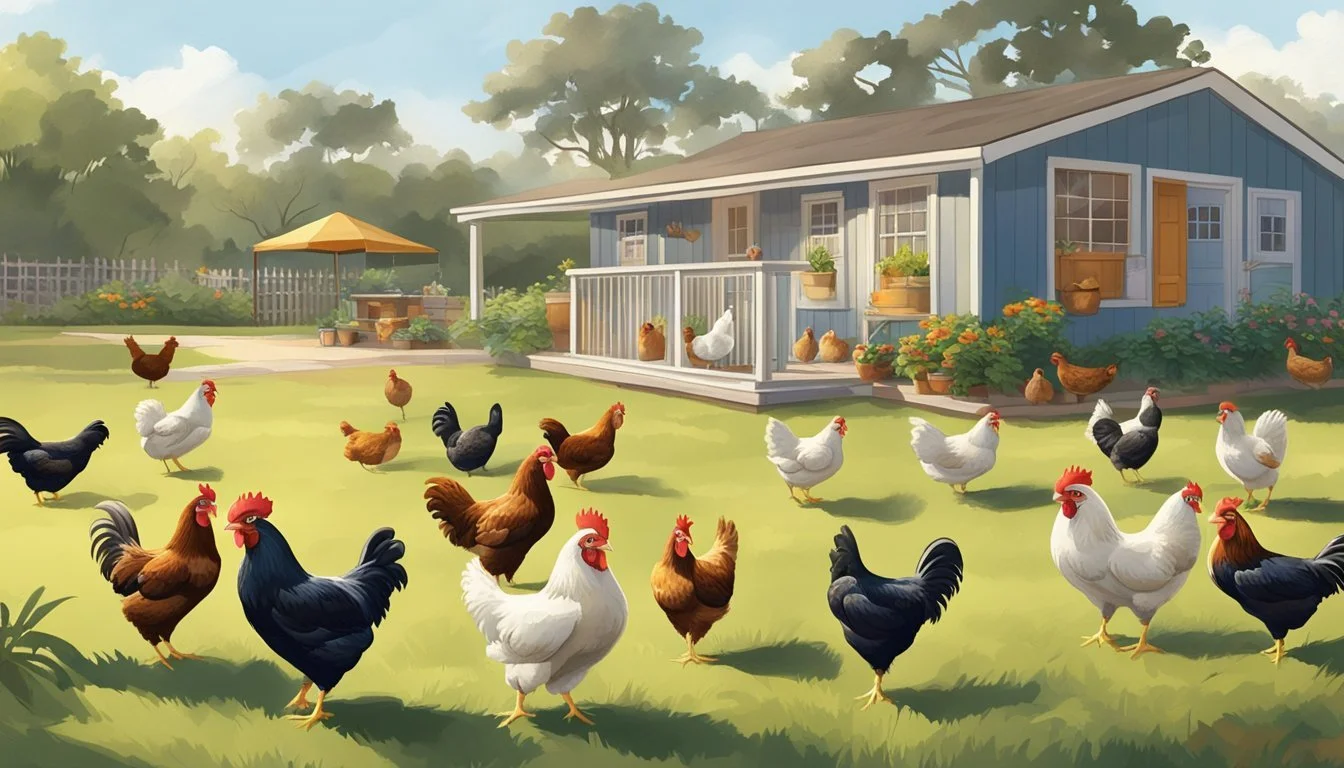Keeping Backyard Chickens in Orlando, FL
Essential Tips for Urban Poultry Farming
Backyard chicken keeping in Orlando, Florida, has become a popular practice for those seeking to embrace a more sustainable lifestyle, providing a personal source of fresh eggs and the joy of caring for chickens. The City of Orlando offers residents the opportunity to legally keep chickens in their backyards through a permitting process. Interested individuals must navigate this process to ensure they adhere to the city's regulations aimed at protecting the health, safety, and welfare of the community.
Orlando's backyard chicken ordinance allows for a limited number of permits to be issued on a first-come, first-served basis, with a maximum of four hens allowed per household. Roosters are not permitted due to the noise disturbance they can create. The initiative is part of a growing trend towards urban agriculture, offering residents not only the benefits of fresh eggs but also the chance to educate family members, especially children, about food sources and responsibility through pet care.
Obtaining a permit requires knowledge of the specific guidelines that regulate the keeping of backyard chickens within Orlando. The rules cover coops' placement, size, and maintenance, underlining the importance of proper husbandry and consideration for neighbors. Compliance with these rules is crucial for the well-being of the chickens, the satisfaction of the chicken keepers, and maintaining harmony within the community.
Understanding Local Ordinances for Keeping Backyard Chickens
In Orlando, Florida, residents interested in keeping backyard chickens must navigate specific city ordinances designed to regulate this practice responsibly.
Orlando Specific Chicken Ordinance
The City of Orlando has an ordinance in place that allows residents of single-family homes to maintain backyard chickens, subject to adherence to certain requirements. This involves obtaining a backyard chicken permit, which is necessary for legal chicken keeping within city limits. It is important to note that the ordinance stipulates strict zoning regulations, and the city issues permits under a controlled system to ensure compliance with these laws.
To obtain a permit, applicants must understand the following key points:
Permits are Limited: The city issues a finite number of backyard chicken permits, specifically capping at 100. These are distributed on a first-come, first-served basis.
Restrictions on Bird Types: Only hens are allowed. The presence of roosters, ducks, geese, turkeys, peafowl, pigeons, or other birds is prohibited.
Home Type Matters: Applicants must reside in a single-family home to be eligible. Keeping chickens is not permitted on duplex, triplex, townhome, or multifamily properties.
Quantity of Chickens: There is a maximum cap on the number of chickens one can keep. Each permit allows for up to four chickens.
For a successful permit application, residents are expected to fully comply with these stipulations, ensuring that they contribute to the community’s health, safety, and neighborhood aesthetics. Adjustments to ordinances can occur, so it is essential for one to review the latest information from the city's resources or contact city officials when considering applying for a backyard chicken permit.
Preparation and Setup for Backyard Chickens
Raising backyard chickens requires thoughtful preparation and setup. Before bringing any chickens into your backyard, it’s essential to choose an appropriate location, ensure proper coop construction, and secure the area from potential predators.
Choosing the Right Location
The right location for backyard chickens must comply with local zoning designations, maintain the required distance from property lines, and provide a safe, clean environment. It should be:
Easily accessible for feeding and cleaning.
Well-drained to avoid puddles around the coop.
Protected from extreme weather conditions.
Locations near the property line need to comply with local setback regulations, typically a minimum of 20 feet from neighbors' residences.
Designing and Constructing a Chicken Coop
A proper chicken coop is imperative for the safety and comfort of backyard chickens. Key elements of coop design include:
Size: Adequate space for the number of chickens, usually 2-3 square feet per chicken inside the coop and 8-10 square feet per chicken in the outside run area.
Ventilation: Ample airflow without direct drafts on the birds.
Insulation: Proper materials to protect chickens from heat and cold.
Nesting Boxes: One box for every 3-4 hens for egg laying.
Roosting Bars: Space for chickens to perch during the night.
A fenced pen or run area attached to the coop allows chickens to roam safely and exercise.
Securing the Area from Predators
To protect chickens from predators, ensure the coop and pen are secure:
Use chicken wire or hardware cloth for fencing, burying it at least 12 inches underground to deter digging predators.
A covered chicken coop or run area prevents predators from entering from above.
Regularly inspect for and repair any gaps or vulnerabilities in the structure.
Consider a mobile chicken coop, also known as a chicken tractor, to allow safe foraging and rotational grazing while providing protection from predators.
Legal Requirements and Regulations
In Orlando, Florida, residents interested in keeping backyard chickens must navigate a series of legal requirements and adhere to specific regulations. The city has established clear guidelines to ensure the health and safety of both chickens and the community.
Permit Process and Classes
To keep backyard chickens legally, a Permit is required. The City of Orlando issues permits on a first-come, first-served basis and strictly limits the number to 100 to control the population. The permitting process includes a requirement for proof of training, which can be obtained from a class offered by UF/IFAS Extension Orange County. This class is designed to educate potential chicken owners about best practices in care and maintenance. Individuals should submit a permit application that complies with the city's ordinances.
Requirements for Permit:
Attendance and completion of a city-approved chicken-keeping class.
A maximum of four (4) chickens is allowed, hens only — no other poultry types or roosters.
Permit is tied to single-family homes only.
No sales, on-site breeding, slaughtering, or consumption of the chickens is permitted.
Understanding Property and Zoning Limitations
Zoning laws play a crucial role in backyard chicken keeping. Orlando residents must ensure their property is zoned accordingly and that any chicken coops are constructed following city codes. Additionally, homeowners should be aware of any Homeowners Association (HOA) rules or Planned Development (PD) regulations that could impose further restrictions.
Property and Zoning Considerations:
Coops must be located in the backyard and meet specific property line setback requirements.
The size of the coop and pen must comply with the city's square feet limitations.
Residents must check for Neighborhood Residential (NR) zoning to confirm eligibility.
Compliance with any other local HOA or PD codes, if applicable.
Day-to-Day Management of Chickens
Proper day-to-day management is crucial for the health and productivity of backyard chickens. Attention to feeding, maintenance, and health monitoring is essential.
Feeding and Nutrition
Chickens require a balanced diet to maintain their health and egg production. Owners should provide a diet consisting primarily of commercial poultry feed, which is formulated to meet their nutritional needs. It is important to:
Offer constant access to fresh water.
Supplement the diet with calcium sources, like oyster shell, for eggshell quality.
Avoid kitchen scraps as they may disturb the nutritional balance and introduce diseases.
Cleaning and Maintenance
Cleanliness is important to prevent disease and pests. Regular cleaning tasks include:
Daily: Remove waste and leftover feed to discourage pests.
Weekly: Change bedding in the coop to keep it dry and clean.
Monthly: Thoroughly clean and disinfect the coop, and inspect for signs of wear or damage.
Proper disposal of chicken manure by composting can provide excellent fertilizer for gardens.
Health Monitoring and Biosecurity
Monitoring the health of chickens involves observing their behavior and appearance for signs of illness. Biosecurity measures should be implemented to prevent the introduction and spread of disease:
Quarantine new birds for at least 30 days before introducing them to the flock.
Implement a footbath at the coop entrance to disinfect footwear and reduce the risk of bringing in diseases.
Regularly check for external and internal parasites, and treat accordingly.
Following these daily management practices ensures the wellbeing of backyard chickens and can lead to a rewarding experience for the owners.
Chicken Breeds and Behavior
Orlando's climate demands careful selection of chicken breeds, and managing rooster behavior is essential for community harmony.
Deciding on Suitable Chicken Breeds
In Orlando's warm weather, breeds like Buff Orpingtons thrive due to their adaptability and friendly demeanor. They are known for their fluffy feathers and robust egg-laying capabilities, often delivering 200-280 eggs per year. Another excellent choice for Orlando’s climate is the Barred Plymouth Rock; recognized for their sturdiness and high egg production, they are a practical choice for beginners.
Dealing With Roosters and Noise Control
Roosters are often a concern in urban settings due to their early morning crowing, which can be a noise nuisance. To maintain peace, it is essential to understand local ordinances regarding rooster ownership. One can mitigate noise by providing roosters with a dark, quiet space to sleep at night, which can help reduce early crowing. Breeding with noise levels in mind is also an option, selecting for more docile and quieter roosters over time.
Egg Production and Usage
Keeping backyard chickens for egg production in Orlando, FL, has garnered significant interest due to its sustainability and the joy of having fresh eggs for personal use. Hen owners can anticipate a healthy hen to lay, on average, one egg per day, although this can vary based on the breed, age, and health of the chickens, as well as environmental factors. Fresh eggs from one's backyard are often more flavorful and nutritious than store-bought ones, attributed to the natural diet and lower stress levels of backyard chickens.
For Orlando residents, fresh eggs are primarily intended for personal use. Egg selling requires adherence to local regulations, which may impose different standards and licenses for those intending to sell eggs. In Orlando, it's essential for potential sellers to understand and comply with these rules to ensure public health and safety.
Here are a few key points concerning egg usage:
Personal consumption: Fresh eggs can be used daily in cooking and baking.
Sharing with community: Surplus eggs are often shared with neighbors and friends.
Educational Value: Families use this opportunity to teach children about food sources and responsibility.
Maintaining records of egg production aids in managing household consumption and determining if there's a surplus for sharing or selling (within permitted regulations). Residents often find that the flavor and quality of their home-produced eggs motivate them to continue and possibly expand their backyard chicken endeavors.
Legal Considerations for Selling and Slaughtering
When keeping backyard chickens in Orlando, Florida, residents must adhere to specific local ordinances that regulate the sale of chickens and their products as well as the slaughtering of chickens.
Selling Eggs and Chickens
In Orlando, selling eggs or chickens raised in backyard settings is strictly prohibited. The local regulations are clear: homeowners are allowed to keep chickens for personal egg consumption but are not permitted to engage in any form of commercial activity. This includes:
No sales of eggs.
No sales of live chickens.
No sales of chicken by-products such as feathers or manure.
Moreover, these restrictions align with the zoning designations under which the residential backyard chicken permits are issued.
Slaughtering Regulations
Slaughtering of chickens in residential zones of Orlando is disallowed. Homeowners must ensure that:
No on-site slaughtering takes place.
No on-site consumption of chickens raised in the backyard is permitted.
These regulations aim to maintain public health and safety, as well as animal welfare. Residents interested in keeping chickens must seek alternatives for processing their chickens that do not involve slaughtering them at their home.
Community and Environmental Impact
Raising backyard chickens in Orlando has substantial effects on both community dynamics and environmental welfare. This activity not only provides a source of fresh eggs but also supports sustainable living practices.
Benefits of Raising Chickens
Fresh Eggs: Residents who cultivate backyard chickens benefit from a consistent supply of fresh eggs. These eggs are often considered superior in taste and nutritional value compared to store-bought ones, due to the chickens' diet and free-range lifestyle.
Health and Sustainability: The activity of raising chickens promotes health and sustainability within the community. Chickens contribute to pest control by eating insects and can be part of a composting system that enriches garden soil, thus reducing waste and encouraging local food production.
Community Gardens: By integrating chickens into community gardens, Orlando residents can enhance the productivity and health of these gardens. The chickens provide natural fertilizer and aid in pest management.
Addressing Common Concerns
Health Regulations: To address health concerns, particularly the risk of Salmonella, local regulations ensure proper coop construction and hygiene practices. It is imperative for owners to follow these guidelines to maintain both human and chicken health.
Neighborhood Harmony: Common worries include noise and odor, which are mitigated through Orlando's permitting process that ensures residents adhere to the number of chickens allowed and maintain their coops responsibly. This careful regulation helps to uphold peace and order within communities.
Resources and Further Learning
Gaining proper knowledge and resources is crucial for the successful raising of backyard chickens in Orlando, FL. The following resources provide essential information and support for both beginners and experienced chicken keepers.
Local Backyard Chicken Classes
Residents of Orlando can enhance their chicken-keeping skills by enrolling in local backyard chicken classes. These classes offer comprehensive training on topics like egg production and proper coop construction. The University of Florida’s IFAS Extension in Orange County provides educational resources and may offer specific classes for backyard poultry enthusiasts. Additionally, the City of Orlando sometimes facilitates classes, which are typically mandatory for permit approval. A nominal fee, such as $20 per household, may apply for these sessions.
Online Communities and Support
For ongoing support, online communities are invaluable. Chicken keepers can join forums and social media groups where members share experiences, offer advice, and provide emotional support. University of Florida’s IFAS Extension and similar educational platforms might have online resources, including guides and articles applicable to Orlando residents. They may cover a variety of topics from feeding your chickens to protecting your flock from predators.
By engaging with both local classes and online communities, individuals can stay informed on the best practices for keeping backyard chickens, ensuring a healthier and more productive flock.











